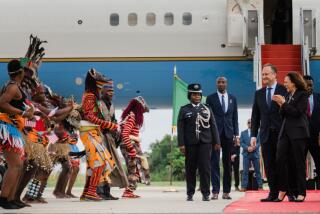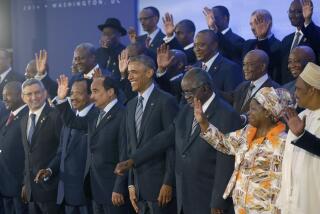Shultz’s Signal on Africa
- Share via
At the commencement of his first trip to Africa as secretary of state, George P. Shultz held an undersize T-shirt next to his oversize abdomen to demonstrate the inadequacy of the State Department budget enacted by Congress. There was validity to his complaint. The demonstration of inadequate resources contrasting with substantial needs also symbolizes American policy toward Africa.
Africa is in crisis, desperately in need of increased American aid--at least a tripling of aid, according to one authoritative study--and its problems are getting worse because of some of the world’s highest birthrates. But the United States has responded with cuts in aid, and has compounded the fundamental problem of overpopulation by cutting off all funding to the two most effective programs--those of the International Planned Parenthood Federation and the United Nations Fund for Population Activities.
Two themes repeated by Shultz on the trip were the importance of self-help and avoidance of dependence on aid. Over and over again, on the six-nation tour, he appealed for a new emphasis on the private sector, which has been strangled by regulation and competing state enterprises in many African nations. Fair enough. But no amount of reform can solve the problem in inadequate investment and aid. Nor will enhanced private sectors pay Africa’s debts that, although small in comparison with the obligations of Latin nations, total an incredible $162 billion. Repayment and debt service are consuming one-third of the export earnings of the debtor nations. Perhaps the secretary will have seen enough now to support additional money for next year’s aid budget in which Africa is slated for only 5% of the total.
The trip at least signals for the first time a direct involvement of the secretary in Africa. At the end of the month he will take another important step --meeting for the first time with Oliver Tambo, leader of the African National Congress, the outlawed opposition organization of South Africa.
U.S. officials have been timid about coming to terms with the reality of the African National Congress for fear of offending the radical right in the United States and the government of South Africa itself. For six years President Reagan has pursued so-called constructive engagement with Pretoria and resisted confrontation. Now a new independence is appearing. The Tambo meeting will coincide with a $50-million supplemental appropriation to provide additional funds for Southern African nations. The money will help some of the nations break the unnatural economic dependence on South Africa now forced on them by circumstance and geography. And it will help disadvantaged non-whites in South Africa pursuant to the sanctions voted last year by Congress.
The effort to strengthen Southern African neighbors of South Africa remains seriously flawed by two elements of American policy. One is the decision, approved by Congress, to fuel the guerrilla war in Angola by sending arms. The other is the petty effort to punish Zimbabwe for the sophomoric behavior of one of its officials at an American Embassy reception last summer, barring this vigorous and pivotal nation from new aid at a time when the United States should be doing everything in its power to strengthen it.
There was more posture than substance to much that the secretary did on this hurried trip. But at least he is engaged. That may facilitate a more vigorous commitment to Africa by the Reagan Administration. Africa needs that commitment. It may now also be clearer to the secretary how important to America it is that Africa develop and flourish as friend and ally, source of raw materials, trading partner and potential customer of enormous dimension.
More to Read
Sign up for Essential California
The most important California stories and recommendations in your inbox every morning.
You may occasionally receive promotional content from the Los Angeles Times.













